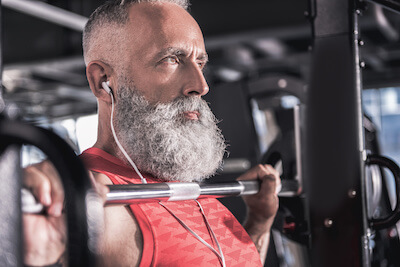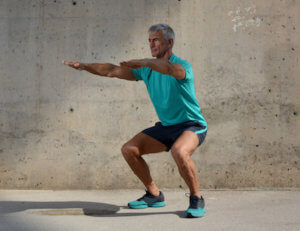What is the Ideal Workout Length for Your Age?
Getting older doesn’t mean you should stop exercising, especially since exercise at any age is such an important factor in your health. However, what may change is your ideal workout length, since certain factions of your physiology change with age. Age can also affect the types of exercises you perform, since different exercises benefit different ages.
And, even if you don’t currently exercise, it is never too late to start since regular exercise slows aging and can lowers your risk for many chronic diseases. These include cardiovascular disease, type II diabetes and some cancers.
So, ready to find out what workout is best for your age?
Let’s take a look!
Your Changing Body
No, not everyone has the same makeup as 85-year-old Hiromu Inada, AKA the oldest iron distance triathlon finisher ever. And yes, that means he completed the 2.4-mile swim, 112-mile bike ride and 26.2-mile marathon in under the 17-hour cutoff, which is something many younger competitors struggle to do. (1)
However, while his story is inspirational, it is also exceptional, especially when we consider he only started exercising in his 60’s when he began swimming for his health. For most of us, taking up swimming at an advanced age would be a great step to take, though taking up extreme endurance sports maybe not so much.
And, there is good reason for this, since as we age, we not only lose cardiovascular capacity at around 1% per-year after age 30, our bones and joints also become more susceptible to breaking and wear. (2)
Plus, the exercises which were most beneficial to us in our youth may not be what are best for our aging bodies. For instance, while swimming is low-impact and easy on aging joints, running is not. There are also concerns with balance and core strength as we get older, which may make agility exercises and core-strengthening work of higher importance.
And, if you do participate in endurance exercise such as distance running or cycling, you may need to change your training approach as you age. This means placing less focus on volume and more on intensity.
For instance, while hours of running in your youth may have produced an extensive aerobic base for you, that base has already been established and there is little point in trying to increase it. Instead, focusing on short, intense bursts such as HIIT or sprint training is a better workout routine for 50-year-old men than for 30-year-old men. This type of training will not only help you maintain muscle mass and aerobic capacity into your latter years, it will help you avoid training plateaus and improve your overall performance.
And if you train to race, that means keeping you competitive longer, and possibly against younger competition—it is possible!
Weight Training for Older Men
Another type of exercise to consider as you age is weight training, which has shown to be outstanding not only for muscle strength, but bone strength, cardiovascular health and overall quality of life. And, much like HIIT or sprint workouts, it takes minimal time to light up fat stores, strengthen muscles, lower blood pressure and help maintain testosterone production.
Plus, resistance training doesn’t need to involve gym memberships or loads of equipment, since bodyweight exercises also work just fine and can be done nearly anywhere. (4)
But, is this the single best exercise for older men, or should you include other workouts?
Finding Your Ideal Workout Length and Type
While extended aerobic workouts may not be the best way to go as we get older, aerobic exercise itself should not be overlooked. This is because the ideal workout routine for 50-year-old men may be a combination of resistance training or HIIT work along with aerobic exercise, although there is another main takeaway to what the best exercise for aging men is: ANY exercise is better than none, and the most important thing is that you select what works best for you and develop a regular exercise routine.
Remember too that aerobic activities also play a strong role in slowing cellular aging along with heart health and other benefits. However, doing nothing but long, slow cardio workouts can lower testosterone while higher-intensity muscle-building exercises increase it, which is why you may want to consider more than one type of exercise.
The takeaway?
The ideal exercise program for you as you age is a combination of aerobic activity and high-intensity strength training. So far as your ideal workout length, it should decrease as you get older and focus less on extended aerobic work and more on HIIT, sprint and/or weight training. (5)
However, the one thing which cannot be emphasized enough is that no matter the type of exercise, what is most important is that you continue exercising no matter your age. Even daily walks can make the difference between poor health and high risk for disease, or an outstanding quality of life and independence well into old age.
Plus, you never know, you just may have what Hiromu Inada has and can challenge him for the title of oldest Ironman finisher!
References:
- https://www.on-running.com/en-us/articles/the-85-year-old-ironman-world-champion
- https://www.ncbi.nlm.nih.gov/pmc/articles/PMC3223374/
- https://www.outsideonline.com/1930911/endurance-guru-joe-friel-says-you-can-still-be-fast-after-50
- https://musqle.com/is-heavy-resistance-training-safe-for-seniors
- https://www.healthline.com/health-news/endurance-not-resistance-training-helps-with-aging#How-endurance-training-impacts-your-cells







